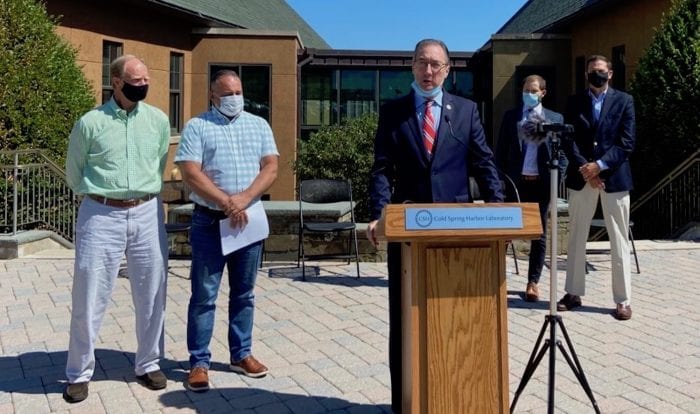CSHL’s Week-Long Power Outage Compromised Research

Cold Spring Harbor Laboratory, which is trying to unlock vulnerabilities in COVID-19 that could help in the public health battle, struggled amid the shifting time frame PSEG established to restore power after Tropical Storm Isaias Aug. 4.

At a press conference Tuesday morning, Aug. 18, state Sen. James Gaughran (D-Northport) spoke alongside two CSHL executives about the damage from PSEG’s changing predictions about restoring power following the storm.
PSEG “failed to provide CSHL with timely and accurate estimates on the restoration of power to CSHL facilities, placing tens of millions of dollars of active biomedical research at risk,” Steven Monez, chief facilities officer, said. “CSHL wants to help PSEG improve its communication protocols so when system failures on this magnitude occur in the future, the best information is communicated and resources are mobilized to provide temporary power to critical research operations.”
Gaughran described how damaging the loss of power, and the uncertain time frame for its restoration, was to CSHL, where several scientists have restructured their research efforts to try to help solve health problems caused by the virus.
“They are on the front lines of dealing with trying to find solutions to COVID-19,” Gaughran said in an interview. “Their research was significantly delayed because of not having the power they needed.”
The state senator contends that the “wrong information” from the New Jersey-based utility was “very costly not just to them, but to the country,” which needs scientific efforts like those undertaken at CSHL to save lives and lessen the severity of symptoms.
In a statement, PSEG said CSHL was on the critical facility list. The company’s major account consultant “escalated the job accordingly” and performed a site visit, according to PSEG. “We have agreed to hold a meeting with Cold Spring Harbor Laboratory to discuss infrastructure improvements.”
A joint New York State Senate and Assembly virtual public hearing will address the power and communication failures from Tropical Storm Isaias Thursday, Aug. 20, at 11 a.m., with oral testimony by invitation only.
Monez will provide testimony about the information PSEG shared with CSHL during the outage. PSEG will also be represented at the meeting.
Meanwhile, Gaughran plans to introduce legislation that will amend public authorities law to authorize an investigation by the New York Public Service Commission during a declared state of emergency.
“I have written legislation to try to cure this problem,” he said. Long Island Power Authority is “supposed to be the oversight agency. They seem to have failed us in making sure the emergency management communication system was working.”
The provision will provide an amendment to allow the Public Service Commission to investigate, make findings and issue penalties against LIPA and its service providers for failure to follow their emergency management plan during a persistent and widespread power outage, he said. Penalties could include denial of recovery of any part of the service restoration costs commensurate with the degree and impact of the outage.
Gaughran remains disappointed with numerous aspects of PSEG’s communication during and after the storm, from being unreachable after a power outage to providing updates that indicate homes and businesses had power when they didn’t.
Utilities should have “so much redundancy in their communication systems that they never have this many problems,” he said, adding this is “clearly an issue that has to be fixed and leadership [at LIPA and PSEG] needs to fix this.”
The extended outage and communication problems were especially damaging to businesses that have just reopened after a prolonged shutdown triggered by the pandemic, he said.
As the hurricane season continues through the end of November, Gaughran said he “wants to make sure this doesn’t happen again. We have got to avoid this.”






